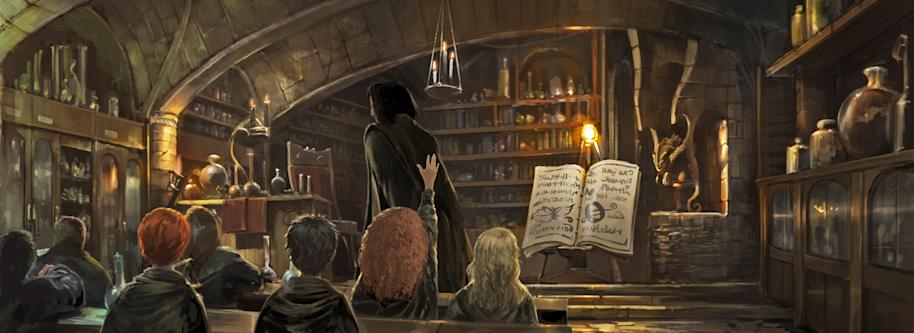
‘Some say he died. Codswallop, in my opinion. Dunno if he had enough human left in him to die’
Ah Hagrid, you didn’t know how right you were. Several years and much Pensieve-searching later, Dumbledore confirmed that Voldemort created Horcruxes. If we consider the soul to be a person’s humanity, then yes – Voldemort had been ripping it out in pieces so that Tom Riddle (who, you’ll recall from Chamber of Secrets, was someone Hagrid knew personally) was now unrecognisable. By this point, Voldemort literally didn’t have enough ‘human’ left in him to die.
‘Fear of a name increases fear of the thing itself’
While the rest of the world spoke in hushed tones of ‘You-Know-Who’ and ‘He Who Must Not Be Named’, Dumbledore insisted that Harry should be bold and speak Voldemort’s name unflinchingly. Sound advice: however, it got turned against Harry during Deathly Hallows when the name became a Taboo used by the Death Eaters. Perhaps Harry should have followed Dumbledore’s example more closely – even when his former pupil had grown up, the headmaster continued to address the Dark Lord, much to his chagrin, as ‘Tom’.
‘I can teach you to bottle fame, brew glory, even put a stopper in death’

Snape might not be fond of many things (his students, for example) but he showed plenty of love for the art of potion-making. During this same lesson, Snape mentioned an item that would prove incredibly useful: the bezoar, an all-purpose poison antidote also noted in Snape’s old Advanced Potion-Making book. Not only did Harry use this information to blag his way through Professor Slughorn’s Potions class, he also saved Ron’s life when his friend ran afoul of some poisoned mead. So Snape really did teach Harry to put a stopper in death.
‘... the trouble is, humans do have a knack of choosing precisely those things which are worst for them’
Dumbledore knew this all too well. His youthful longing to possess the Deathly Hallows ended in a confrontation in which his sister died and his brother blamed him. Since then, Dumbledore had tried to avoid the lure of power, even refusing the role of Minister for Magic on several occasions. However, he’d find himself tempted by the Hallows once more, as evidenced by his damaged hand in Half-Blood Prince. True to his own words, even a wise wizard like Dumbledore was only human and still had a knack for making regrettable choices.
‘Something you have to say is more important than the Ministry of Magic, Potter?’

Something along the lines of ‘Voldemort’s back’ perhaps? Ludicrous as it seems to Professor McGonagall in Philosopher’s Stone, there will come a time when this schoolboy’s words will be of far greater value than the Ministry’s. Enter Dolores Umbridge with her annoying little cough and endless educational decrees, prompting the sharp minds at Hogwarts to question the Ministry’s true agenda. As a staunch Umbridge naysayer, McGonagall should try asking Harry that same question in about four years.
‘To the well-organised mind, death is but the next great adventure’
This feels like a loaded sentence, especially when you consider Dumbledore’s past and future. Having once attempted to unite the Hallows and become ‘Master of Death’, he appeared to have dismissed this venture and accepted his mortality. Remember also that Dumbledore was no spring chicken and, knowing that Voldemort was attempting to return to power, realised he may not survive this time around. This makes us wonder – does Dumbledore say these words to comfort Harry, knowing he may one day have to carry on without him? Or was he reassuring himself?
‘Always the innocent are the first victims’
Far from the typical ‘ruddy stargazer’ chat, Ronan’s words rang true three years later when Harry witnessed the death of Cedric Diggory (the words ‘kill the spare’ still haunt us to this day). The other casualties in Goblet of Fire, namely Bertha Jorkins and Frank Bryce, were simply in the wrong place at the wrong time. And let’s not forget the death of Hedwig in Deathly Hallows – a moment that perfectly symbolised the loss of Harry’s childhood innocence and left us all teary-eyed.
Ronan’s use of the word ‘always’ implies inevitability, as though history is repeating itself. Such is the case here, as Voldemort murdered several bystanders during his initial rise, often framing innocent people for his crimes.
‘It does not do to dwell on dreams and forget to live’

These wise words can take on many meanings. In Philosopher’s Stone, Harry was advised to stop seeking out the Mirror of Erised as he had begun to neglect his own happiness to gaze at a life that can never be. Harry’s dreams took a turn for the worse years later when he was tormented by visions from Voldemort’s mind. These nightmares didn’t just traumatise Harry, they were eventually used as a weapon against him, such as the time he believed Sirius had been captured. To dwell on these dreams was a dangerous thing indeed.
As Muggles, it’s important to remember that there’s life beyond the Harry Potter stories. Yes, honestly. And no matter how much we yearn to live in the wizarding world, we must never lose our grip on reality. Instead, we use the lessons learned from books to make our own world a better place. Speaking of books...
‘... there will be books written about Harry – every child in our world will know his name!’
Since millions of Harry Potter books have been sold worldwide since Philosopher’s Stone was first published, we think it’s safe to say that McGonagall was right.



